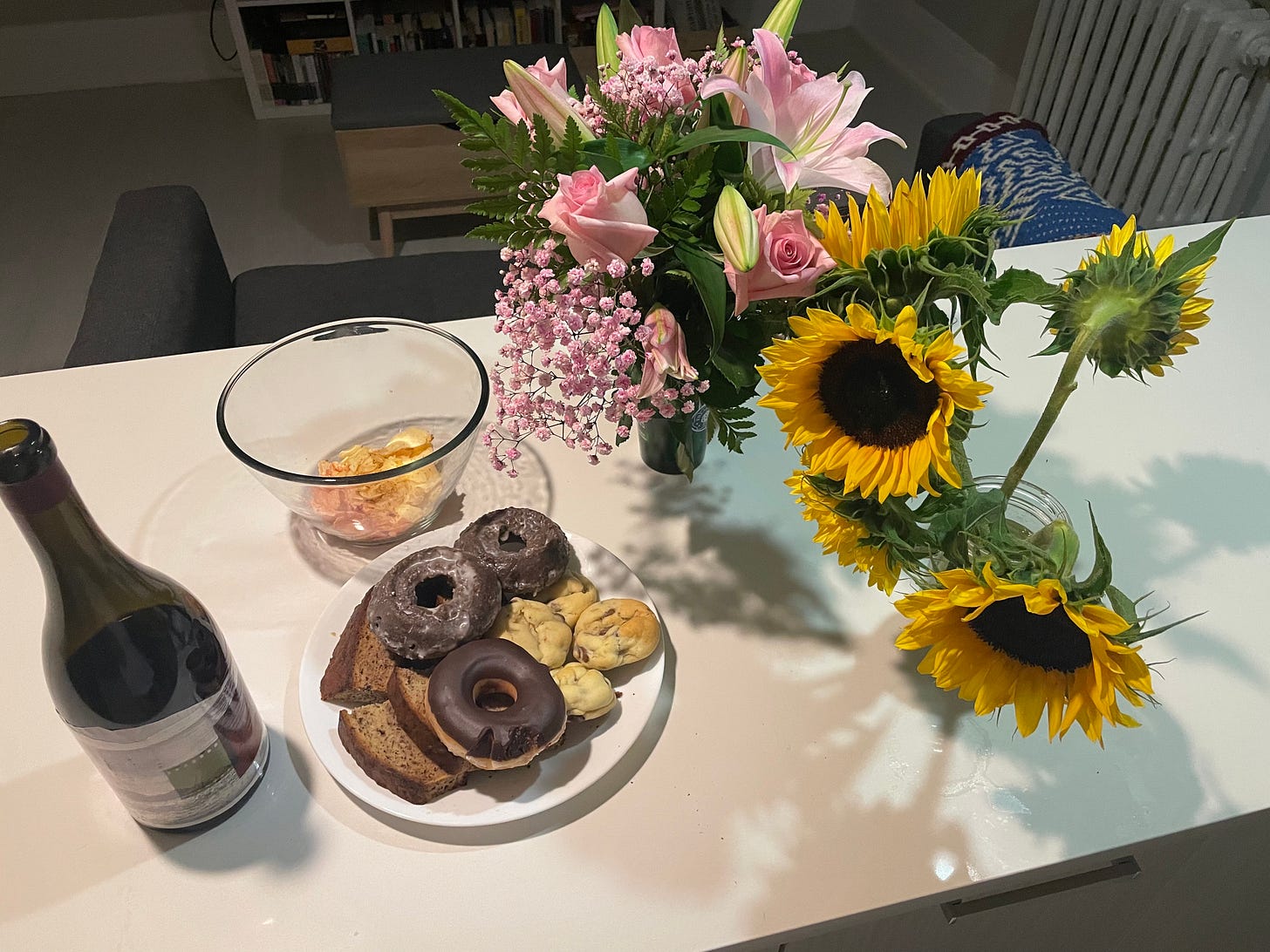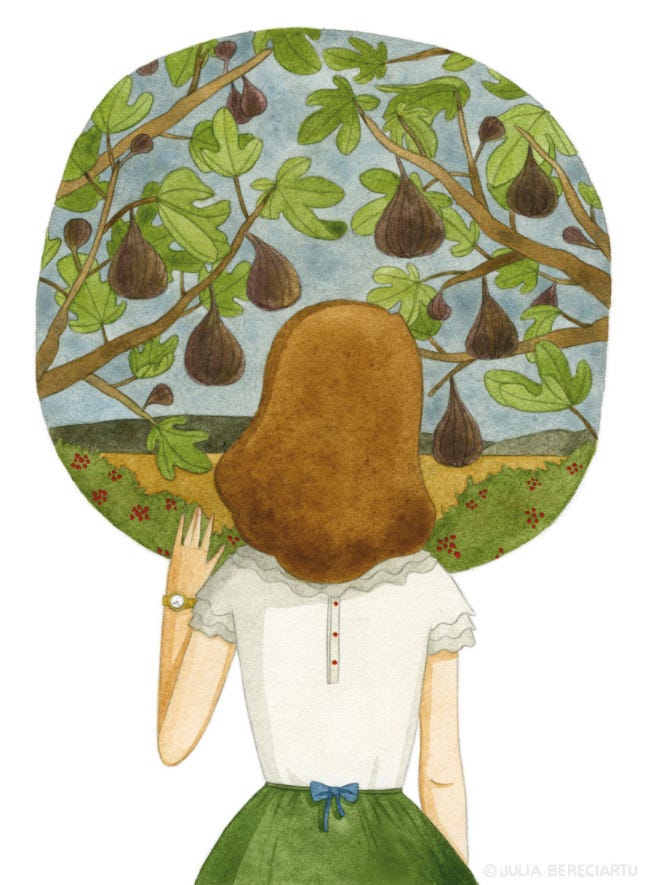We had, a couple days ago now, what I believe to have been a successful housewarming party in our new apartment. In its current state, the place stinks the nauseating smell of overripe bouquets which nonetheless I will continue to display even after the bulk of their petals have drooped and fallen away. I enjoy hanging on, sometimes, for too sickeningly long. As guests left, I may have lingered in the entranceway, hugging persons eagerly, urging them to come back quickly and often with embarrassing fervour. It’s so peculiar and envy-inducing to have beautiful, clever, stylish, generous, curious, well-read, and adjectivable friends; but I feel assured that they are flawed, even if only at the level of their judgement, because they make time to spend with me.
Amidst other worthwhile issues, we talked about writing, about the almost-necessary narcism or autoeroticism (in a Lordeian sense and not) inextricable from the act of writing: to write is to believe, to varying degrees, that there is value in and reason for the transmission of your ideas. These are my thoughts, worthy of readers or at the very least of graphite and paper. Writing is a soap box, an advert, a performance. Though I write this because I want you to know what I have to tell you, I’m ashamed at my presumption that you should care one bit. As I see it, writing is painfully embarrassing. Even when it isn’t about you, you is part of what you write——you, your ego, your (lack of) confidence, your tastes, your interests. You are on display when you write, letting your inner workings and preoccupations hang out. Even now, I use the pronoun you——royal you——to universalize this experience for writers and create distance between my object and myself, when really I’m considering me and my and I. I am on display, all hung out. I pretend this is about you, but this is about me, because I’m writing. How discomfiting.
In everything I’ve ever written, I have been the subject if not the topic. Yet, hopeful and helpful to me, De Man (a Nazi who unfortunately also transcribed a few noteworthy things) in “Autobiography as De-Facement” contends that “just as we seem to assert that all texts are autobiographical, we should say that, by the same token, none of them is or can be.” Which is to say that while this is about me because it is by me, and I’m discussing concepts which are perfectly real and reasonable, this right here, what you’re reading, is also a work of fiction, a production. When I write, I create and curate my self and my mind. I build scenarios, I am a character: “myself, only in disguise,” as says Sylvia Plath’s narrator in The Bell Jar. This is both me and not——that facet of me which I can bear to present to you. A costume, or slight removal, makes the double-bind of writing more tolerable: my ego wills that I write and, since the narrator of my writing is a fabrication, I need not feel their self-consciousness for having exhibited themself so openly. This in’t me; I author fiction.
Which is also to say that if my friends didn’t want me to be solipsistic and existential on Substack, writing metaphysically about producing a version of myself through authorship, they needn’t have encouraged me at my party.
Reading Plath is delightfully and worryingly sympathetic, isn’t it? Is it troubling or reassuring that I and many other femme readers feel such tender empathy with and recognition toward Esther Greenwood? In that educated, white, first-worlder kind of way, I wallowed in self pity reading lines such as:
I felt dreadfully inadequate. The trouble was, I had been inadequate all along, I simply hadn’t thought about it.
The one thing I was good at was winning scholarships and prizes, and that era was coming to an end.
It reminded me, stylistically and thematically at times, of Elif Batuman’s wonderful The Idiot. Esther called to mind Susanna Kaysen’s Susanna in Girl, Interrupted. Truthfully, almost immediately a whole corpus of texts to which this was antecedent sprung to mind and I became more endeared to it for all of the subsequent art that it made possible. Literary ancestors are important; unearthing a genealogy of women writers is utopic.
The first half was warm and comforting to me and lulled me into forgetting what I knew about it so that I expected, if only for a brief moment, that I was in for a quirky and morbid Bildungsroman riddled with non sequiturs and disaffection. What about that goofy poisoning sequence? Very gross and funny. But I no more turn up my nose at the evenly-paced and sombre second act. It’s vulnerable and incisive… electrifying. The titular bell jar is purportedly the ultimate metaphor of the text, but I am much more inclined to argue that unwellness is like being an Eisenhowerian pickled baby. I am, I am, I am… a foetus suspended in death and dread and vinegar.
Anyways, Plath writes a compelling bit of fiction.
I’ve recently found out about an old television programme called “Flipper” which is itself uninteresting to me. What knocked me over was that one of the dolphins who played the title character of the series, the bottlenose dolphin named Kathy, killed herself. Kathy deliberately stopped breathing, drowned herself, after a struggle with depression. Aidan tells me dolphins are known to do this when they find their lives unfulfilling——they’re too clever not to. My own lamentations seem far less important now that I have confirmation that all creatures——even majestic and intelligent beings far superior to myself——experience terrible pain. There is, in my heart, an uneasy solidarity and a disquieting rage. Since I learnt this, it’s become very important that I think hard about how I could console a melancholic dolphin, whether they would want my compassion, and if I could even recognize the symptoms of their unease. “Every breath they take is a conscious effort… she chose not to take that next breath.”
Before jumping into season two of Yellowjackets, I thought it appropriate to flit through Lord of the Flies. I long assumed that I read this as a young person, because I could, without any difficulty, summarize it for others, but it turns out I never actually had. I like it though, and I feel kinship with Simon. On episode 275 of My Favorite Murder, called “Raise the Snail,” Karen and Georgia discuss the “real life” story of Lord of the Flies in which a group of Tongan boys in 1965 were stranded on an island and flourished during their exile; they made music with bespoke instruments and became excellent survivalists and artisans. Alas, this was not a narrative that Golding could have foreseen: since he was an English private school teacher, he could not stretch his imagination enough to depict boys behaving any other way but badly.
Predictably, the second season of the Showtime series escalates as the stranded ensemble resort to cannibalism. I was captivated by the episode “Qui” in which young Shauna delivers her baby, toils to breastfeed her little cherub, and then wakes up from unconsciousness to find that he was actually stillborn. The grief she feels at having lost a child that she initially sought to abort is particularly poignant. But I am irritated with the lack of cannibalism in this episode——the case of the discarded placenta. The girls have already by this point transgressed into cannibalism, feasting on the body of Jackie after she’s accidentally slow-roasted in the forest. But, bizarrely, when Shauna goes into labour, there’s no mention at all of what her maternal body may contribute to the wellbeing of the group. It seems to me that the writers assume a viewership who more readily will watch girls hunt and consume one another than even discuss the ingestion of placenta and breastmilk. The former is a conceivable kind of abjection, the latter apparently off limits. Evidently, considering the latching difficulties Shauna experienced with her dream-sequence baby, it’s possible that she would be too malnourished to produce any milk to share with her teammates. Even still, the potential (both horrifying if non-consensual and generous-though-risky if voluntary) of breast-feeding your friends to ensure their survival is strange and intimate and interesting. What a missed opportunity since it isn’t even a dialogue. With trepidation I thought perhaps the girls would come to some modest proposal, but no——no that would be far too macabre. Worse still, Shauna pushes through placenta previa only for the girls to ignorantly wrap up and disregard all its juicy nutrition as if she didn’t work hard for 9 long months to make that meal. They’ll later hunt and kill one of their own without much apprehension, but seem to pay no mind to the whole new organ that fell into their laps. Are these girls, in their woodland purgatory, above offal? Or, are the showrunners too intimidated/ignorant to explore or adequately represent the abundance and possibilities brought about by gestation and labour.
When comparing the series to Golding, I came to the realization that creatives confined themselves to the binary: warrior or witch. When planewrecked, survivors turn either to magic and the occult, or to combat and political stratagem. Woo-woo women or macho men. Alas, if only we could see beyond this dichotomy to the third option——socially, spiritually, and intellectually rich——offered to us by Tongan teenagers: wellbeing.
Since I have nothing at all but time on my hands, I’ve been reading and viewing in abundance——I could talk about Barbie and Oppenheimer, but why bother.
Instead, I read and was changed by Didion’s The Year of Magical Thinking. Her account of loss and grief, her diligent outline of the inescapable memory-spiralling that exhausted her in the months following her husband’s passing, was unlike any memoir I’d previously read. The style with which she expressed her overwhelm, her complex devotion and love for John, the function that language had in her mourning process, is touching while also pedagogical. She assessed grief under a microscope even as she made use of it. I always find it grating when persons condescend about the passive voice (which seemed to be quite a buzzy grammar topic in undergrad or in essay-writing workshops) since this kind of talk is never especially justified. Or, is never any more justified than pointing out any other error of thoughtless writing——all carelessness is to be avoided, but when it’s deliberate than the passive voice is a nonissue since it communicates what and how the author intended. For example, Didion so often in this books uses the passive voice in a way that I find compelling and thematically effective: when someone dies, it may be that things are happening more than people do things. There is at once this urge to dole out the blame, to assess who was doing what rightly and wrongly, but Didion pushed that aside ultimately to focus on what was and remained rather than who’s at fault for how it turned out. To quote Dawes: things happen——that’s all they ever do.
(I’ve long listened to this song as a response to or in conversation with Alanis Morissette’s “Ironic.” Thoughts?)
In other news, if you can stomach the terrible chagrin of writing, my awesome friend Raquel has founded (and allowed me to tag along to) a new art and literature newsletter called Paloma, intended to house the creative and intellectual works of writers near and far! Please check it out and send your submissions here!








Yay so glad I found you through Raquel’s newsletter! Also what you’ve said here is too relatable 😩🖤